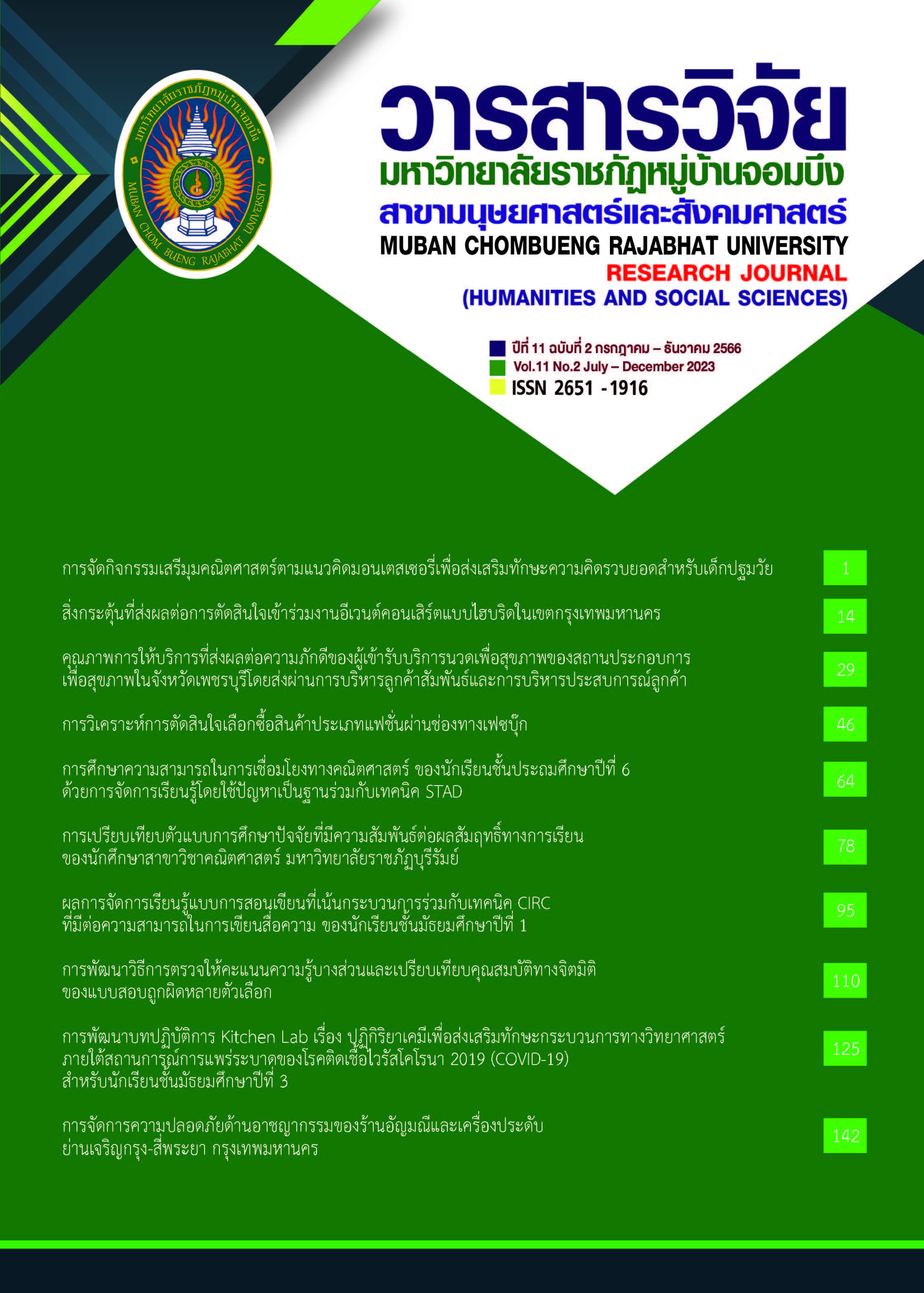การจัดกิจกรรมเสรีมุมคณิตศาสตร์ตามแนวคิดมอนเตสเซอรี่ เพื่อส่งเสริมทักษะการคิดรวบยอดสำหรับเด็กปฐมวัย
คำสำคัญ:
เด็กปฐมวัย, มุมคณิตศาสตร์, มอนเตสเซอรี่, ความคิดรวบยอดบทคัดย่อ
การวิจัยนี้มีวัตถุประสงค์เพื่อ 1. ศึกษาการจัดกิจกรรมเสรีมุมคณิตศาสตร์ตามแนวคิดมอนเตสเซอรี่ 2. เปรียบเทียบทักษะความคิดรวบยอดก่อนและหลังการจัดกิจกรรมเสรีมุมคณิตศาสตร์ตามแนวคิดมอนเตสเซอรี่ กลุ่มเป้าหมายเป็นเด็กปฐมวัย อายุ 4-5ปี กำลังศึกษาอยู่ชั้นอนุบาลปีที่ 2 ภาคเรียนที่ 1/2563 โรงเรียนบ้านปากดุก อำเภอหล่มสัก จังหวัดเพชรบูรณ์ จำนวน 19 คน ได้มาโดยการเลือกแบบเจาะจง เครื่องมือที่ใช้ในการทดลอง 1) แผนการจัดกิจกรรมเสรีมุมคณิตศาสตร์
ตามแนวคิดมอนเตสเซอรี่ จำนวน 20 แผน 2) คู่มือและการวิจัยนี้มีวัตถุประสงค์เพื่อ 1. ศึกษาการจัดกิจกรรมเสรีมุมคณิตศาสตร์ตามแนวคิดมอนเตสเซอรี่ 2. เปรียบเทียบทักษะความคิดรวบยอดก่อนและหลังการจัดกิจกรรมเสรีมุมคณิตศาสตร์ตามแนวคิดมอนเตสเซอรี่ กลุ่มเป้าหมายเป็นเด็กปฐมวัย อายุ 4-5ปี กำลังศึกษาอยู่ชั้นอนุบาลปีที่ 2 ภาคเรียนที่ 1/2563 โรงเรียนบ้านปากดุก อำเภอหล่มสัก จังหวัดเพชรบูรณ์ จำนวน 19 คน ได้มาโดยการเลือกแบบเจาะจง เครื่องมือที่ใช้ในการทดลอง 1) แผนการจัดกิจกรรมเสรีมุมคณิตศาสตร์ตามแนวคิดมอนเตสเซอรี่ จำนวน 20 แผน 2) คู่มือและชุดกิจกรรมมุมคณิตศาสตร์ตามแนวคิดมอนเตสเซอรี่ จำนวน 20 ชุด 3) แบบทดสอบวัดทักษะความคิดรวบยอด จำนวน 1 ชุด โดยใช้แบบแผนการวิจัย One-Group Pretest-Posttest Design วิเคราะห์ข้อมูลโดยการหาค่าเฉลี่ย ค่าความแปรปรวน ส่วนเบี่ยงเบนมาตรฐาน ทดสอบความแตกต่างโดยใช้ค่าสถิติร้อยละ
ผลการวิจัยพบว่า 1. ผลการจัดกิจกรรมเสรีมุมคณิตศาสตร์ตามแนวคิดมอนเตสเซอรี่ หลังการจัดกิจกรรมพบว่า โดยภาพรวมมีผลคะแนนค่าร้อยละพัฒนาสูงขึ้น 2. ผลการเปรียบเทียบทักษะความคิดรวบยอด ก่อนและหลังการจัดกิจกรรมเสรีมุมคณิตศาสตร์ตามแนวคิดมอนเตสเซอรี่ โดยภาพรวมที่ดำเนินการเปรียบเทียบ จำนวน 3 ด้านได้แก่ 1) ด้านการนับจำนวน 2) ด้านการจำแนกประเภท และ 3) ด้านการเปรียบเทียบ ผลพบว่าหลังการจัดกิจกรรมมีค่าร้อยละพัฒนาสูงขึ้น ซึ่งสอดคล้องกับสมมติฐานที่ตั้งไว้ชุดกิจกรรมมุมคณิตศาสตร์ตามแนวคิด
มอนเตสเซอรี่ จำนวน 20 ชุด 3) แบบทดสอบวัดทักษะความคิดรวบยอด จำนวน 1 ชุด โดยใช้แบบแผนการวิจัย One-Group Pretest-Posttest Design วิเคราะห์ข้อมูลโดยการหาค่าเฉลี่ย ค่าความแปรปรวน ส่วนเบี่ยงเบนมาตรฐาน ทดสอบความแตกต่างโดยใช้ค่าสถิติร้อยละ
ผลการวิจัยพบว่า 1. ผลการจัดกิจกรรมเสรีมุมคณิตศาสตร์ตามแนวคิดมอนเตสเซอรี่
หลังการจัดกิจกรรมพบว่า โดยภาพรวมมีผลคะแนนค่าร้อยละพัฒนาสูงขึ้น 2. ผลการเปรียบเทียบทักษะความคิดรวบยอด ก่อนและหลังการจัดกิจกรรมเสรีมุมคณิตศาสตร์ตามแนวคิดมอนเตสเซอรี่
โดยภาพรวมที่ดำเนินการเปรียบเทียบ จำนวน 3 ด้านได้แก่ 1) ด้านการนับจำนวน 2) ด้านการจำแนกประเภท และ 3) ด้านการเปรียบเทียบ ผลพบว่าหลังการจัดกิจกรรมมีค่าร้อยละพัฒนาสูงขึ้น ซึ่งสอดคล้องกับสมมติฐานที่ตั้งไว้
เอกสารอ้างอิง
กระทรวงศึกษาธิการ. (2560). หลักสูตรการศึกษาปฐมวัย พุทธศักราช 2560. กรุงเทพฯ: โรงพิมพ์คุรุสภาลาดพร้าว.
กรรณิการ์ สุริยมาตร .(2560). การพัฒนากิจกรรมเสรีตามแนวคิดไฮสโคปในการพัฒนาพฤติกรรมทางสังคมของเด็กปฐมวัย. ปริญญาครุศาสตรมหาบัณฑิต บัณฑิตวิทยาลัย, มหาวิทยาลัยราชภัฏมหาสารคาม.
กุลยา ตันติผลาชีวะ. (2555). การจัดกิจกรรมการเรียนรู้สำหรับเด็กปฐมวัย. กรุงเทพฯ: เบรน-เบสบุ๊คส์.
คมขวัญ อ่อนบึงพร้าว. (2556). ผลการจัดกิจกรรมการเกษตรที่มีต่อทักษะพื้นฐานทางคณิตศาสตร์ของเด็กปฐมวัย. หลักสูตรปริญญาการศึกษามหาบัณฑิต สาขาวิชาการศึกษาปฐมวัย, มหาวิทยาลัยศรีนครินทรวิโรฒ.
จุไรศิริ ชูรักษ์. (2557). การเรียนรู้ความคิดรวบยอด. กรุงเทพฯ: บริษัท สำนักพิมพ์แม็ค จำกัด.
จุฬินฑิพา นพคุณ. (2560). การสอนแบบมอนเตสซอรี่ในบริบทไทย. หลักสูตรศึกษาศาสตรบัณฑิต สาขาวิชาการศึกษาปฐมวัย, คณะครุศาสตร์ มหาวิทยาลัยสวนดุสิต.
บานเย็น ชุมภู. (2555). ผลจัดประสบการณ์โดยใช้กิจกรรมศิลปะสร้างสรรค์ที่มีต่อทักษะพื้นฐานทางคณิตศาสตร์ของเด็กปฐมวัย. หลักสูตรครุศาสตรมหาบัณฑิต สาขาวิชาการจัดการ หลักสูตรและการเรียนรู้ มหาวิทยาลัยราชภัฏนครสวรรค์.
ปณิชา มโหสิทธยากร. (2554). ทักษะพื้นฐานคณิตศาสตร์ของเด็กปฐมวัยที่เล่นเกมการศึกษาเน้นเศษส่วนของรูปเรขาคณิต. หลักสูตรปริญญาการศึกษามหาบัณฑิต สาขาวิชาการศึกษาปฐมวัย, มหาวิทยาลัยศรีนครินทรวิโรฒ.
วิลาวัณย์ ทิพย์สุวรรณพร. (2556). ผลการจัดกิจกรรมศิลปะแบบวางแผนปฏิบัติ ทบทวน ที่มีต่อการคิดเชิงเหตุผลของเด็กปฐมวัยโรงเรียนวัดท่ามะปรางจังหวัดสระบุรี. วารสารศึกษาศาสตร์. 11 (1): 16.
อัญชลี ไสยวรรณ. (2554). ผลการจัดกิจกรรมเสริมประสบการณ์โดยใช้กระบวนการสร้างความคิดรวบยอดที่มีต่อความสามารถทางคณิตศาสตร์ของเด็กปฐมวัย. วารสารมนุษยศาสตร์และสังคมศาสตร์. 10 (2): 2.
อัมพร เบญจพลพิทักษ์. (2557). การเตรียมความพร้อมทักษะพื้นฐานด้านคณิตศาสตร์ในเด็กปฐมวัย. กรุงเทพฯ: สถาบันราชานุกูล กรมสุขภาพจิต.
Freud. (1985). Early childhood play. [Online]. Accessible: https://sites.google.com/site/Dekthiyniphakhti. (January 19, 2020).
ดาวน์โหลด
เผยแพร่แล้ว
รูปแบบการอ้างอิง
ฉบับ
ประเภทบทความ
สัญญาอนุญาต
ลิขสิทธิ์ (c) 2023 วารสารวิจัยมหาวิทยาลัยราชภัฏหมู่บ้านจอมบึง สาขามนุษยศาสตร์และสังคมศาสตร์

อนุญาตภายใต้เงื่อนไข Creative Commons Attribution-NonCommercial-NoDerivatives 4.0 International License.
วารสาร TCI อยู่ภายใต้การอนุญาต Creative Commons Attribution-NonCommercial-NoDerivatives 4.0 International (CC BY-NC-ND 4.0) เว้นแต่จะรุบุไว้เป็นอย่างอื่นโปรดอ่านหน้านโยบายของเราสำหรับข้อมูลเพิ่มเติมเกี่ยวกับการเช้าถึงแบบเปิด ลิขสิทธิ์ และการอนุญาต



